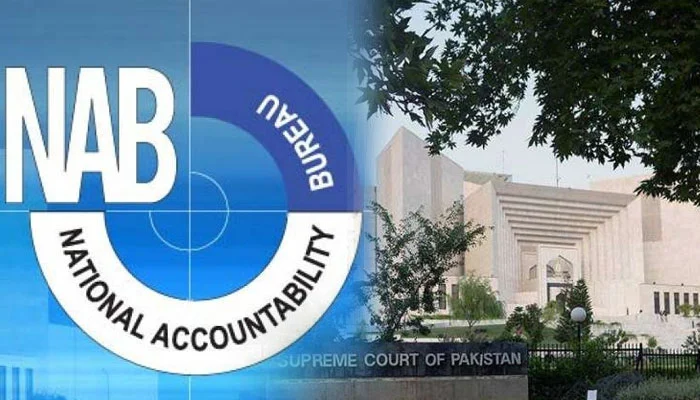Apex Court ruling of 15th September striking down amendments to NAB law challenged
It has been prayed that the top court set aside its Sep 15 ruling & provide ‘any other relief’ that the superior court ‘deems fit and proper’
ISLAMABAD ( Web News )
The Supreme Court of Pakistan’s September 15 ruling that struck down some amendments made to the National Accountability Ordinance (NAO), 1999, was challenged on Friday.
In the wake of the top court’s verdict upholding the Practice and Procedure Act 2023, Abdul Jabbar — through his counsel Senator Farooq Hamid Naek — filed a plea in the apex court, calling for setting aside the ruling on the NAB law.
The Supreme Court had in a majority decision of 10-5 on October 11, upheld the law formulated to regulate the affairs of the top court, but noted that although the right to appeal provided against a decision taken under Article 184(3) will not be applicable retrospectively, it will apply to those ruling which were issued after the law came into effect.
The NAB amendments case was related to public importance; thus, it fell under the original jurisdiction of the superior court i.e. Article 184(3) of the Constitution.
Parliament passed the Supreme Court (Practice and Procedure) Act, 2023, in April, and the apex court struck down the amendments to the NAB law in September, allowing the right to appeal.
In his petition, Abdul Jabbar stated that he had “condemned unheard” but mentioned that although he was not a party to the case earlier, the court had also not issued a notice to him in this regard.
The petitioner also said that the court should exercise its jurisdiction under Article 184(3) “sparingly” and that the conditions precedent for the exercise of this original jurisdiction is “not fulfilled in this case”.
He claimed that the September 15 judgment was issued “without considering the fundamental principles of parliamentary democracy as well as laid down a principle for striking out legislation”.
“The […] judgment has declared the provisions of the amending Acts of the Parliament on the policy consideration and contrary to the ‘will of the people’ which the later scribed through the subject amendments,” the petition read.
Abdul Jabbar also mentioned that through the judgment, the court assumed the position of being a ‘legislator’ and ‘policy maker’, which is beyond the scope of powers of the Supreme Court under Article 184(3).
“The […] order suffers from errors floating on the surface of the record and is liable to be reviewed,” the petitioner added.
Concluding the plea, Abdul Jabbar prayed that the top court set aside its September 15 ruling and provide “any other relief” that the superior court “deems fit and proper”.

